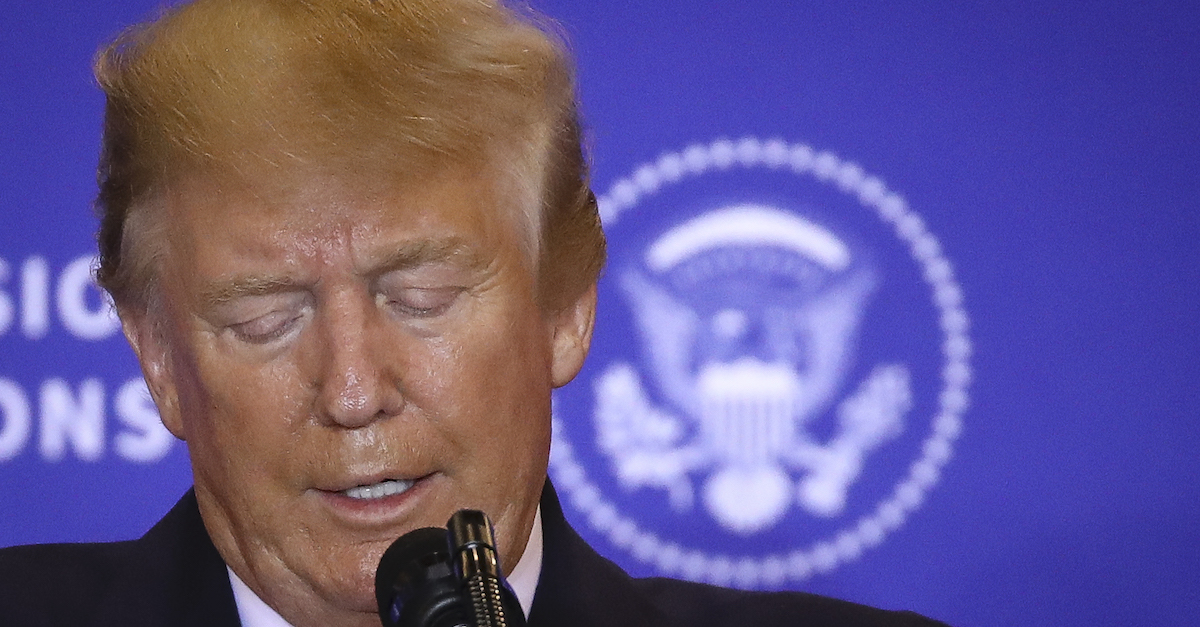
The U.S. Government Accountability Office (GAO) determined the White House violated federal law when it placed a hold on military aid for the Ukraine. Legal experts generally noted the GAO’s findings as more of the same from the Trump administration.
“Faithful execution of the law does not permit the President to substitute his own policy priorities for those that Congress has enacted into law,” the independent auditing agency noted on Thursday. “[The Office of Management and Budget (OMB)] withheld funds for a policy reason, which is not permitted.”
Former New Jersey prosecutor and current Law&Crime Network host Bob Bianchi weighed in—categorizing the GAO’s determination as a legal no-brainer.
“This finding is rather obvious from a constitutional perspective. Our Founding Fathers designed three branches of government to be checks and balances against one another,” Bianchi said via email. “Hence, when the executive branch fails to carry out the laws passed by Congress a constitutional breakdown occurs. The GAO finding is a reflection of the idea that the president can not unilaterally decide to ignore laws passed by Congress, a co-equal branch of government.”
“Yet again, actual objective analysis clearly finds the President was breaking the law in his scheme to withhold aid to Ukraine,” noted national security attorney Bradley P. Moss. ”How much of this are Republican Senators willing to put up with before they say ‘enough is enough’?”
Federal criminal defense attorney Tor Ekeland offered a terse take on the White House’s culpability. He said: “If the OMB acted unlawfully, so did the President.”
But what, exactly, would the 45th president’s potential liability look like here?
South Texas College of Law Professor Josh Blackman offered a nuanced dive across a several-post thread on Twitter—and tossed a bit of cold water on most other legal observers’ reactions.
”The [GAO] found that OMB violated the Impoundment Act, and suggested that the President violated his duty to take care that the laws are faithfully executed,” Blackman said. “To be precise, [President Trump] did not (and could not) personally violate the Impoundment Act, because the law does not control his personal actions. His liability, if it exists at all, derives from his failure to supervise that his subordinates faithfully execute the law.”
“OMB violated the statute, not [President Trump],” Blackman said in another tweet. “Whether the President violated his duty of faithful execution is a different question.”
“The Unitary Executive theory…is not relevant here,” Blackman continued. “There is no inherent, [Article] II power over spending money. That is a power Congress delegates to the executive branch. But the President retains an obligation to supervise how the law is faithfully executed.”
American Civil Liberties Union attorney Josh Block pushed back against Blackman’s dismissive analysis—nothing that Trump himself pushed for OMB to make the hold.
https://twitter.com/JoshABlock/status/1217847838522191874?s=20
“Directing a subordinate to violate the law is not consistent with a duty of faithful execution,” Blackman shot back—again asserting a violation of the president’s constitutional duties but apparently still excusing any untoward behavior viz. the federal statute in question.
To which Block responded:
In the criminal law context, “Whoever willfully causes an act to be done which if directly performed by him or another would be an offense against the United States, is punishable as a principal.: 18 USC 2(b). So I’m not sure why distinction you’re drawing makes any difference
And though no one really knows who he is, lead House impeachment manager Rep. Adam Schiff (D-Calif.), who is effectively acting as a prosecutor at this juncture in the impeachment battle as the trial in the Senate slowly begins, made hay out of the GAO report—signaling Democrats’ likely intention to reference those findings in the fight ahead.
“Trump illegally withheld U.S. taxpayer dollars as leverage to get the Ukrainian president to help him win reelection, another indication of the extreme lengths to which the President would go to coerce a foreign power into helping him cheat to win,” he said.
For a detailed breakdown of that blockbuster report by the nonpartisan internal government watchdog see Law&Crime’s previous reporting here.
[image via Drew Angerer/Getty Images]